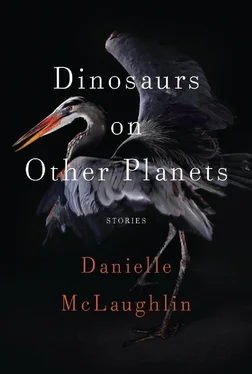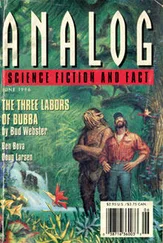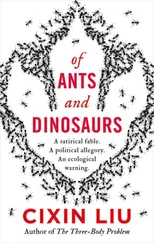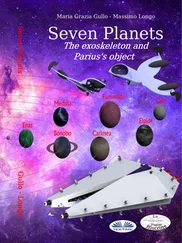Colman had allowed junk to accumulate — magazines, spent batteries, a cracked mug on the windowsill — and she got a sack and went around the room, picking things up. The lathe and wood turning tools — chisels, gouges, knives — were on a desk in the corner, and she packed them away in a box. She put aside Colman’s pajamas, and dressed the bed with fresh linen, the blue teddy bears jolly on the duvet, the rabbit propped on a chair alongside. Standing back to admire it, she noticed Colman in the doorway. He had his hands on his hips and was staring at the sack.
“I haven’t thrown anything out,” she said.
“Why can’t the child sleep in the other room?” He went over to the sack, dipped a hand in, and took out a battery.
“Emer’s room? Because Emer will be sleeping there.”
“Can’t he sleep there, too?”
She watched him drop the battery back into the sack and root around, a look of expectancy on his face, like a boy playing lucky dip. He brought out the cracked mug, polished it on his trousers, and then, to her exasperation, put it back on the windowsill.
“He’s six,” she said. “He’s not a baby anymore. I want things to be special; we see so little of him.” It was true, she thought, it was not a lie. And then, because he was staring at her, she said, “And I don’t want Emer asking about…” She paused, spread her arms wide to encompass the room. “About this.” For a moment he looked as if he were going to challenge her. It would be like him, she thought, to decide to have this conversation today, today of all days, when he wouldn’t have it all year. But he picked up his pajamas and a pair of shoes she had missed beneath the bed and, saying nothing, headed off across the landing. Later, she found his pajamas folded neatly on the pillow on his side of the bed, where he always used to keep them.
—
COLMAN WAS ON THE phone in the hall when the car pulled up in front of the house. Kate hurried out to greet them and was surprised to see a man in the driver’s seat. Emer was in the passenger seat, her hair blacker and shorter than Kate remembered. “Hi, Mam,” she said, getting out and kissing her mother. She wore a red tunic, the bodice laced up with ribbon like a folk costume, and black trousers tucked into red boots. She opened the back door of the car and the child jumped out. He was small for six, pale and sandy haired, blinking, though the day was not particularly bright.
“Say hi to your granny,” Emer said, and she pushed him forward.
Kate felt tears coming, and she hugged the child close and shut her eyes, so as not to confuse him. “Goodness,” she said, stepping back to get a better look, “you’re getting more and more like your uncle John.” The boy stared at her blankly with huge gray-green eyes. She ruffled his hair. “You wouldn’t remember him,” she said. “He lives in Japan now. You were very small when you met him, just a baby.”
The driver’s door opened and the man got out. He was slight and sallow skinned, in a navy sports jacket and round dark-rimmed glasses. One foot dragged slightly as he came round the side of the car, plowing a shallow furrow in the gravel. Kate had been harboring a hope that he was the driver, that at any moment Emer would take out her purse and pay him, but he put a hand on her daughter’s shoulder and she watched Emer turn her head to nuzzle his fingers. He was not quite twice her daughter’s age, but he was close — late forties, she guessed. The cat had accompanied Kate outside and now it rubbed against her legs, its back arched, its tail working to and fro. Kate waited for her daughter to make the introductions, but Emer had turned her attention to Oisín, who was struggling with the zip of his hoodie. “Pavel,” the man said, and, stepping forward, he shook her hand. Then he opened the boot and took out two suitcases.
“I’ll give you a hand with those,” Colman said, appearing at the front door. He wrested both cases from Pavel and carried them into the house, striding halfway down the hall before coming to a halt. He put the suitcases down beside the telephone table and stood with his hands in his pockets. The others stopped, too, forming a tentative circle at the bottom of the stairs.
“Oisín,” Emer said, “say hello to your granddad. He’s going to take you hunting in the forest.”
The boy’s eyes widened. “Bears?” he said.
“No bears,” Colman said. “But we might get a fox or two.”
Pavel shuffled his feet on the carpet. “Oh, Daddy,” Emer said, as if she’d just remembered, “this is Pavel.” Pavel held out a hand and Colman delayed for a second before taking it. “Pleased to meet you,” he said, and he lifted the cases again. “I’ll show you to your rooms.”
Kate remained in the hall and watched them climb the stairs, Colman in front, his steps long and rangy, the others following behind. Pavel was new, she thought; the child was shy with him, sticking close to his mother, one hand clutching the skirt of her tunic. Colman set a suitcase down outside Emer’s bedroom. He pushed open the door, and from the foot of the stairs, Kate watched her daughter and grandson disappear into the garish, cluttered room, its walls hung with canvasses Emer had painted during her Goth phase. Colman carried the other suitcase to John’s room. “And this is your room,” she heard him say to Pavel, as she went into the kitchen to make tea.
“How long is he on the scene?” Colman said when he came back downstairs.
“Don’t look at me like that,” she said. “I don’t know any more than you do.”
He sat at the table, drumming his fingers on the oilcloth. “What class of a name is Pavel, anyway?” he said. “Is it eastern European or what? Is it Lithuanian? What is it?”
She debated taking out the china but, deciding it was old-fashioned, went for the pottery mugs instead. “I expect we’ll hear later,” she said, arranging biscuits on a plate.
“She shouldn’t have landed him in on top of us like this, with no warning.”
“No,” she said, “she shouldn’t have.”
She found the plastic beaker she’d bought for their last visit. It was two Christmases ago, and the mug was decorated with puffy-chested robins and snowflakes. She polished it with a tea towel and put it on the table. “Every time I see Oisín,” she said, “he reminds me of John. Even when he was a small baby in his pram he looked like John. I must get down the photo album and show Emer.”
Colman wasn’t listening. “Are we supposed to ask about the other fellow at all now?” he said. “Or are we supposed to say nothing?”
Her eyelid was fluttering so fiercely she had to press her palm flat against her eye in an effort to still it. “If you mean Oisín’s father,” she said, “don’t mention him, unless Emer mentions him first.” She took her hand away from her face and saw her grandson standing in the doorway. “Oisín!” she said, and she went over, laid a hand on his soft, fine hair. “Come and have a biscuit.” She offered the plate and watched him survey the contents, his fingers hovering above the biscuits but not quite touching. He finally selected a chocolate one shaped like a star. He took a small, careful bite and chewed slowly, eyeing her the way he had eyed the biscuits, making an assessment. She smiled. “Why don’t you sit here and tell us all about the airplane?” She pulled out two chairs, one for the child, one for herself, but the boy went around the other side of the table and sat next to Colman.
He had finished the biscuit, and Colman pushed the plate closer to him. “Have another,” he said. The boy chose again, more quickly this time. “Tell me,” Colman said, “where’s Pavel from?”
“Chelsea.”
“What does he do?”
Читать дальше












